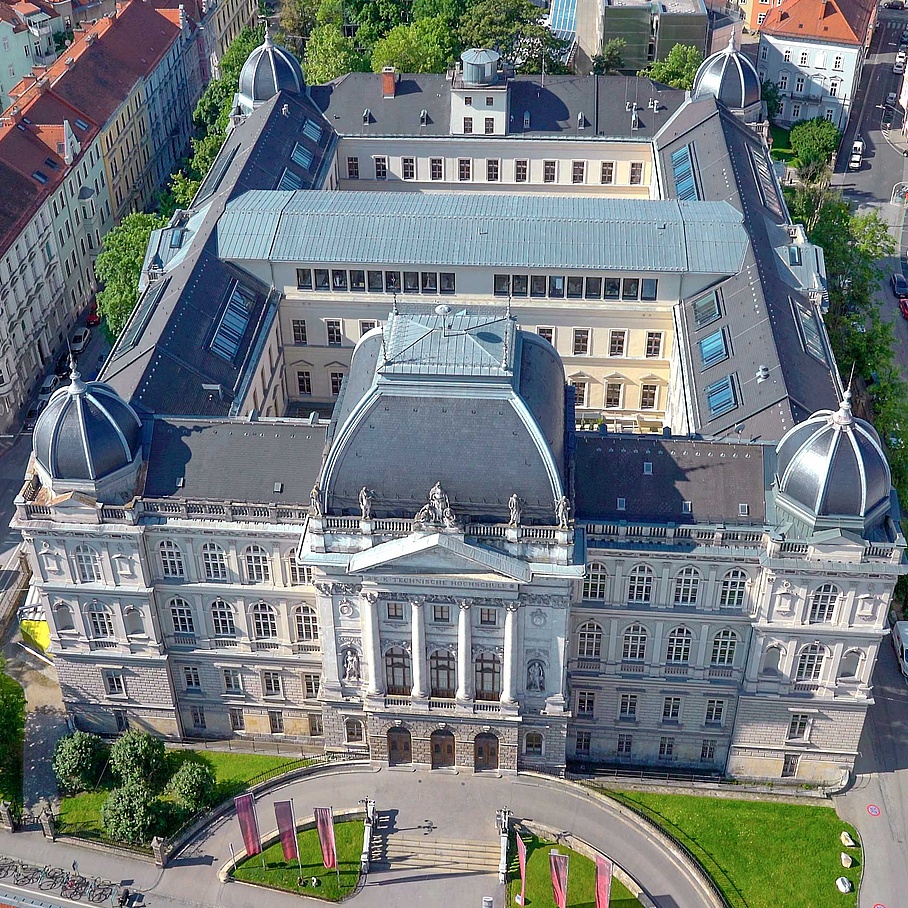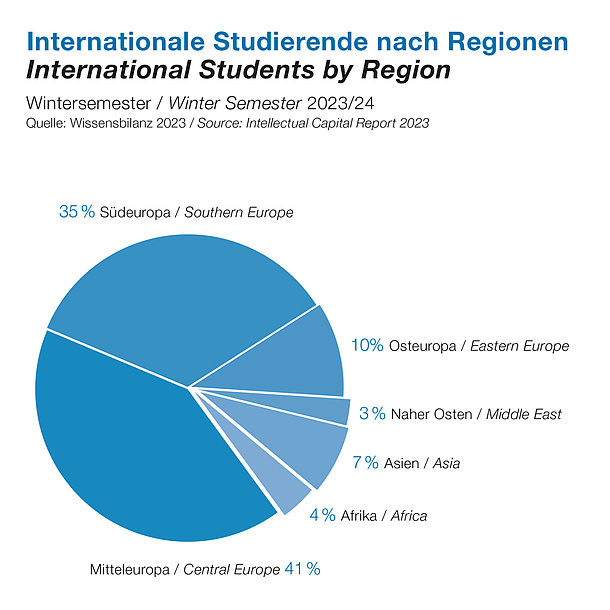
Facts and Figures
- 3,935 staff total
- of which are academic staff 1,932
- of which are mandated instructors/student assistents 854
- of which are non-academic staff 1,151
- 13,443 regular students (WS)
- 7 faculties
- 96 institutes
- 3 campus locations in Graz
- 208.6 mio € federal budget 2023
- 88.4 mio € income from third-party funds 2023 (incl. CAMPUSonline)
- Closing of accounts
- Rectorate, Senate, University Council
- Organisation Chart
(as of 31 December 2023)
Research
TU Graz combines its research into five Fields of Expertise. Through the promotion of Lead Projects, TU Graz is developing existing top research areas.
To the page Focus on Research
Research and Teaching @ TU Graz
TU Graz in International Rankings
QS World University Rankings 2026
- Rank 427
QS World University Rankings by Subject 2025
- Architecture and Built Environment: ranking group 151-200
- Mechanical, Aeronautical & Manufacturing Engineering: ranking group 201-250
- Chemical Engineering: ranking group 251-300
- Computer Science & Information Systems: ranking group 251-300
- Materials Sciences: ranking group 201-250
- Electrical & Electronic Engineering: ranking group 301-350
- Mathematics: ranking group 351-400
- Chemistry: ranking group 301-350
- Biological Sciences: ranking group 651-700
- Physics & Astronomy: ranking group 401-450
- Civil & Structural Engineering: ranking group 201-275
ARWU (Shanghai) Ranking of World Universities 2023
- ranking group 801-900
ARWU (Shanghai) Ranking of Academic Subjects 2022
- Earth Sciences: ranking group 201-300
- Chemistry: ranking group 301-400
- Computer Science & Engineering: ranking group 301-400
- Materials Science & Engineering: ranking group 301-400
- Chemical Engineering: ranking group 401-500
- Biotechnology: ranking group 401-500
Times Higher Education (THE) World University Ranking 2025
- Ranking group 601-800
THE Ranking 2024 – subjetcs
- Computer Science: ranking group 151-175
- Engineering & Technology: ranking group 301-400
- Physical Sciences: ranking group 601-800
Leiden Ranking 2023
- PP Top 10%: world rank 558
- PP industry: world rank 13
U-Multirank 2022
- 16 A rankings
- 8 B rankings
Research
- EU Horizon Europe programme: 37 projects
- of which ERC grants: 3
- EU H2020 programme: 46 projects
- of which ERC grants: 4
- EU Digital Europe programme: 4 projects
- 15 Christian Doppler-Laboratories
- 2,260 publications in 2023
- 25 patent applications, 6 patents granted in 2023
- Leading position in Austrian Competence Centres (COMET programme) as cooperation of science and industry/business; participation in
- 5 K2-Centres
- 13 K1-Centres
- 6 K-Projects
- Research sponsored by the Austrian Science Fund (FWF):
- 4 START projects
- Participation in 3 Special Research Areas
- 3 doc.funds / doc.funds connect
- about 58 ongoing stand-alone projects
(as of 31 December 2023)
Teaching and Studies
TU Graz offers bachelor’s, master’s, teacher training and doctoral programmes as well as postgraduate programmes. Master’s programmes held in English are a key prerequisite for the exchange of international students and teaching staff.
Degree programmes at TU Graz:
- 19 Bachelor's programmes (of which 6 NAWI-Graz study programmes)
- 36 Master's programmes (of which 20 in English and 15 NAWI-Graz study programmes)
- Doctoral programmes in 14 Doctoral Schools (all of them taught in English)
- 11 Postgraduate programmes
Studying @ TU Graz
Students
- 13,443 students total
- of which women: 28.6 %
- of which men: 71.4 %
- of which 26 % international students
- 1,780 beginners total in winter semester 2023/24
- 1,855 graduates 2022/23 (bachelor's, master's, doctoral progammes)
(as of 31/12/2023)
Cooperations
Successful research lives from cooperation with strong partners – worldwide. TU Graz cultivates a variety of collaborative models.
Public-private Partnership
- With renowned companies
- From endowed professorships to shared research infrastructure
Public-public Partnership
- Cooperations with universities, research and educational institutions
- Shared teaching
- Cooperative research activities and shared use of expensive research infrastructure
Research and Business @ TU Graz
Public-public Partnership
In the global competition for scarce resources and the brightest minds TU Graz erlies on strategic cooperations. TU Graz works together extensively with renowned universities in all fields.
More on the international partnerships of TU Graz with universities and research institutions
Public-private Partnership
Partner companies 2023:
- 13 endowed professorships
- 31 Lecture hall and seminar room sponsorships as well as career partners
- 42 Members of the Technology and Society Forum (Alumni Assossiation)
- 56 sponsored TU Graz 100 scholarships and scholarships abroad from 14 Technology and Society Forum members
Past and Present
Founded by Archduke Johann in 1811 TU Graz writes history – then as now.
TU Graz can look back on more than 200 years of science, passion and technology.
Enjoy reading about the people and events shaping life at TU Graz today in print and online news News+Stories.
Publications and reports
The main print publications, reports and agreements of TU Graz to download or as e-paper.
![[Translate to Englisch:] Fields of Expertise. Bildquelle: Lunghammer - TU Graz [Translate to Englisch:] Eine junger Frau arbeitet in einem Labor.](https://www.tugraz.at/fileadmin/_processed_/6/0/csm_Fields_of_Expertise_by_Lunghammer_tugraz_89005503d0.jpg)



